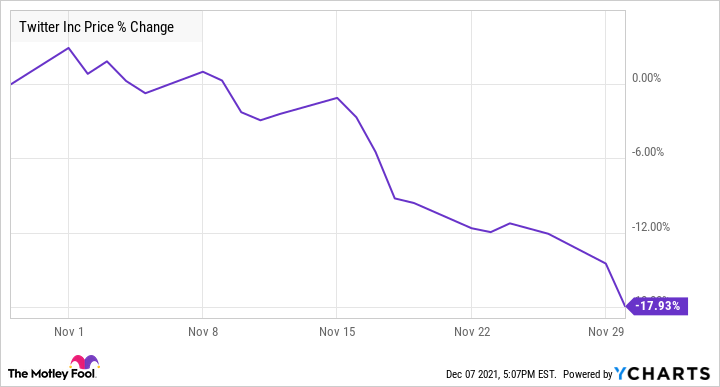What happened
Shares of Twitter (TWTR) pulled back last month as the social media company got swept up in a broader sell-off of growth stocks and traders reacted poorly to news that Jack Dorsey was stepping down as its CEO. According to data from S&P Global Market Intelligence, Twitter stock finished November down 18%.
The stock, already sliding previously, fell sharply at the end of the month after the CEO change was announced.
So what
There was little direct news out on Twitter for most of the month, but investors in November were reacting to the disappointing earnings report it delivered at the end of October. The stock also lost ground in the middle of the month as growth stocks in general fell due to concerns over the Federal Reserve's plans to tighten its monetary policy.

Image source: Getty Images.
The month's big news event was the resignation of Jack Dorsey -- one of the most closely followed leaders in tech -- on Nov. 29.
The Twitter co-founder is also the CEO of Square, and had led both companies simultaneously for seven years. In a tweet, Dorsey said he believed that Twitter no longer needs to be led by one of its founders. Chief Technology Officer Parag Agrawal became CEO effective immediately; Dorsey will remain on the board until his term expires in 2022.
The stock initially rose on the news as investors viewed it as good news that Twitter would finally be getting a full-time CEO, but closed that day down 2.7% as that perception changed. It fell another 4% on Nov. 30, and declined for the first three days of December as well.
Now what
Analysts were mixed in their reaction to the news, but Agrawal wasted little time getting to work, announcing a restructuring of the leadership team last Friday. Then on Dec. 7, the company said it was acquiring Quill, a Slack-like messaging app, to help it improve its direct messages.
Investors have long regarded Twitter as an underachiever that's been plagued by poor execution. The company has a large, engaged audience, but its attempts to monetize and grow its user base have been unsuccessful compared to those of peers like Facebook and Snapchat. Nonetheless, putting someone in the CEO's office who can focus solely on one company seems like a step in the right direction -- especially someone like Agrawal, who's a veteran of Twitter. However, it will likely take a while for him to have an impact on the business.






